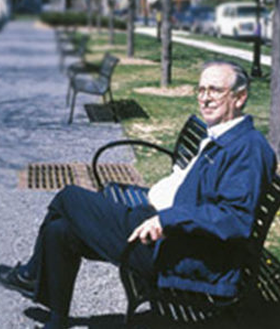heading
2002: Ignacio Rodríguez-Iturbe, USA
For Professor Ignacio Rodríguez-Iturbe, professional inspiration stems from “a profound desire to understand how nature works." Such a desire helped Professor Rodríguez-Iturbe climb to the mountain top in his chosen profession, hydrology. The Venezuela-born Rodríguez-Iturbe was the first South American to receive the Stockholm Water Prize.

Professor Rodríguez-Iturbe’s scientific contributions have had important theoretical and practical meaning for hydrology’s development as an Earth Science. They have also increased understanding of the planet’s climatic system, where water’s circulation place a decisive role. His research has led to greater understanding of meteorological and hydrological events like extreme floods and droughts, which can cause human suffering, environmental damage and economic loss. During the 1970s Professor Rodríguez-Iturbe developed a mathematical model for long-term extremes such as these. His formulations have been used extensively throughout the world, for example, in forecasting river flows and variations in water levels.
In addition, Professor Rodríguez-Iturbe contributed to the development of methods to quantify the accuracy and value of hydrologic data. This concept is now adopted in hydrological and meteorological services. It has been used in the USA, Canada and Great Britain to evaluate the utility of their data collection systems.
In the mid 1970s, Professor Rodríguez-Iturbe introduced ”Bayesian approaches” (a mathematical tool to combine information from many different sources which have varying degrees of accuracy) to improve different models for river flows and to predict the likelihood of extreme hydrological events. This type of approach is now adopted in many Earth Sciences, for example, as a way of combining outputs from different weather or climate models or as a way of integrating models and opinions for environmental risk assessment.
In the 1980s and through the 1990s, Professor Rodríguez-Iturbe and his collaborators proceeded to reformulate the theories on the formation of river basins in a geomorphologic respect (geomorphology is the science of Earth’s surface terrains). Through work that showed that nature transports water and sediment out of the watershed in the most energy efficient way possible, he was able to establish equations that, once solved, yielded the drainage pattern that nature will produce under different climatic and geologic conditions.
Professor Rodríguez-Iturbe also spearheaded and formulated the mathematical representation of rainfall as random, active point processes. Because of this it is now possible to simulate rainfall patterns in time and space over many years, creating sequences that mimic how nature may behave in the future and use the results in engineering design or analysis.
Recently, Professor Rodríguez-Iturbe defined the concept of ecohydrology to explain the interaction of the atmosphere and the hydrology with plants and soil in a natural system. In-depth studies within this new field now constitute a new scientific front within hydrology and ecology, and the results of research in this area will be important for the understanding of global carbon cycles and climate variation.
Professor Rodríguez-Iturbe’s passion for teaching is well-known, as is his dynamic set to solve problems. He is also a distinguished lecturer and author of many scientific articles and several books.
In all his work, the strongest motivation has been a profound desire to understand how nature works.